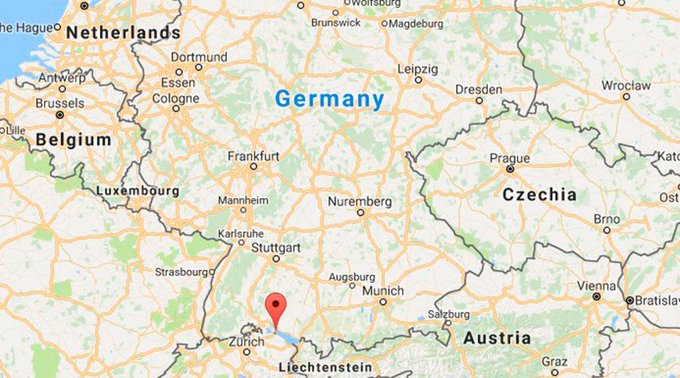‘European knee-jerk reaction - Arab psycho or criminal is seen as terrorist’
Annie Machon is a former intelligence officer for MI5, the UK Security Service, who resigned in the late 1990s to blow the whistle on the spies’ incompetence and crimes with her ex-partner, David Shayler. Drawing on her varied experiences, she is now a public speaker, writer, media pundit, international tour and event organiser, political campaigner, and PR consultant. She has a rare perspective both on the inner workings of governments, intelligence agencies and the media, as well as the wider implications for the need for increased openness and accountability in both public and private sectors.

There is a fusing of terminology between a terrorist, a criminal and mentally ill people, and in Europe, it seems to depend on skin color. If someone happens to be Arab, he might be called a terrorist, claims former MI5 intelligence officer Annie Machon.
The man suspected of the deadly knife attack in Hamburg on Friday was supposed to have been deported, long ago, according to the German media.
German outlets claim Berlin missed a deadline to return him to Norway, where he first applied for asylum.
RT: We're seeing appalling terrorist attacks on trains, in the streets and now at a supermarket. Is this the new reality Europe will have to face? Will the German government change its policy toward migrants?
Annie Machon: I don’t think Angela Merkel is showing any indication she wants to change her policy. Obviously, in 2015, she opened Germany to asylum seekers. It was a very good hearted gesture to people who would suffer the atrocities of war in many Middle Eastern countries. But frankly Germany was overwhelmed; the authorities were overwhelmed – they couldn’t keep track.
There is a report that came out earlier this year from the Federal Office for the Protection of the Constitution (BfV), which is the domestic security agency in Germany, which said they estimated about 10,000 Salafist – fundamentalist Islamists - were in Germany, and 680 of them were under investigation, because they were potentially radicalized and potentially violent.
So the intelligence agencies in Germany as well are facing an uphill battle just trying to keep on top of what is going on in their country. The correlation there between the welcoming arms of the German people to the refugees, which was a wonderful thing to do. But the correlation between that and increase in so-called lone wolf attacks – not least the lorry attack in Berlin before Christmas last year, which killed 12 people - is amazingly high. So I am sure the debate is going to go on in Germany about this.
RT: The attacker shouted "God is Great" in Arabic during the attack. Do you fear the assault will trigger more Islamophobia in Germany?
AM: Unfortunately we’ve seen over the last couple of years this type of lone wolf attack, which are attributed to fundamentalist Islamist violence and are causing an upsurge of right-wing hysteria, Islamophobia, and some of it can be stoked by the mainstream media.
However, something I have been writing over the past few years is the conflation of terminology between terrorist, criminal and mentally ill people. It seems to depend very much on the color of one’s skin in Europe, whether you are defined as a criminal or a mentally ill person, or indeed a terrorist. If you happen to be of Arab extraction, then you might well be called a terrorist, which means you face far more severe penalties under the law.
There is a very much of an overlap between the three categories – we get mentally ill and stable psychopathic people getting involved in organized crime, getting involved in terrorist groups, particularly ISIS. We just get the plain mentally ill, who would go out there and perhaps think: “If I cry out ‘Allah is great!’ while I do this, it might give me more standing, might give me more meaning.” They just want justification for what they are going through.
So it is a very messy situation. I think our intelligence agencies, as well as our governments, need to clarify exactly what they mean by terrorism, what they mean by crime and how they treat the mentally ill, who might use those justifications for what they feel impelled to do.
RT: Until they have that re-think in the way they categorize people and treat them, is it a case that this has become a new normality and that people should anticipate these attacks and constantly be vigilant?
AM: I think probably that is the case sadly in most countries now. We’ve had a couple of cases in London as well, where young men have suddenly used knives to attack people and cried out in the same manner. But when their cases come to trial, rather than being deemed to be terrorists, they have indeed being assessed to be mentally ill. So yes people do need to be vigilant – that is the new reality. It is very sad that we have to think like that. Particularly walking around, wondering if there is going to be a lorry or a car plowing into a group of people.
There have been many, many incidents like this that are getting reported from other countries across Europe, where people have just done that because of road rage, or because they’re drunk, or because they’re driving under the influence, or whatever. But the automatic reflex of all our populations now: is this is a terrorist attack? And that is that sort of a knee-jerk reaction, that fear has been created. That of course, at least from an intelligence perspective, is a pure definition of terrorism. Even if someone is doing something like this is not actually acting with a political motivation – we fear they might be. Terrorism is the use of violence for political means.
The statements, views and opinions expressed in this column are solely those of the author and do not necessarily represent those of RT.





0 Comments:
Post a Comment
Subscribe to Post Comments [Atom]
<< Home